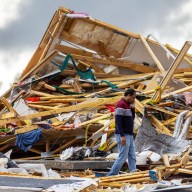SEOUL, South Korea – North Korea defied world powers and carried out an underground test Monday of a nuclear bomb Russian officials said was comparable to those that obliterated Hiroshima and Nagasaki. The incident drew condemnation from Washington to Beijing and set the Communist regime up for a showdown with the United Nations.
The UN Security Council was meeting later Monday in New York to discuss what President Barack Obama called Pyongyang’s “blatant defiance” of resolutions banning the regime from developing weapons of mass destruction. British Prime Minister Gordon Brown condemned the test as a “danger to the world.” Russia’s Foreign Ministry called it “a serious blow to international efforts” to prevent the spread of nuclear weapons.
In Ottawa, Prime Minister Stephen Harper issued a statement condemning the test as reckless and provocative.
“North Korea’s aggressive weapons programs represent a grave threat to international security, and are specifically troubling for stability in Northeast Asia,” he said.
“We hope all international actors will join in denouncing the North Korean regimes nuclear test and its recent ballistic missile launch, ” Harper added.
French officials said they would push for new sanctions, and even traditional Pyongyang ally China said it was “resolutely opposed” to the test, which Russian officials estimated yielded a powerful 10-to 20-kilotonne blast – enough to flatten a city and far more than North Korea managed in a 2006 atomic test.
Pyongyang’s unprecedented defiance raises the stakes in the mounting standoff over its nuclear program.
Last month, Pyongyang launched a rocket despite international calls for restraint, abandoned international nuclear negotiations, restarted its nuclear plants and warned it would carry out the atomic and long-range missile tests.
“We’re heading for a full-blown crisis with the North,” said Peter Beck, a Korean affairs expert who teaches at American University in Washington.
The rise in tensions comes amid speculation about who will succeed North Korea’s authoritarian leader, 67-year-old Kim Jong Il, who is believed to have suffered a stroke last August.
Kim, who inherited the leadership from his father in 1994 and rules the country of 24 million with an iron fist, has three sons but has not publicly named a successor.
Though desperately poor, North Korea increasingly has turned inward. With last month’s controversial rocket launch and Monday’s nuclear test, Kim clearly wants to show its people that the country remains strong, analysts said.
“The fact that North Korea is undertaking this nuclear test amid great economic and political turmoil might be a sign that North Korea is trying to escape from some kind of internal difficulty,” former Russian president Mikhail Gorbachev said during a visit to Seoul.
Beck predicted Pyongyang would parade the nuclear test before the North Korean people to drum up support for Kim and his regime.
“Kim Jong Il is trying to demonstrate his virility and that they are a power to be reckoned with,” he said.
Monday’s atomic test was conducted shortly before 10 a.m. about 80 kilometres northwest of the northern city of Kilju, Russian Defence Ministry spokesman Alexander Drobyshevsky said, speaking on state-run Rossiya television.
Two hours later, Pyongyang’s official Korean Central News Agency declared that the regime had “successfully conducted one more underground nuclear test on May 25 as part of measures to bolster its nuclear deterrent for self-defence.”
The U.S. Geological Survey registered seismic activity in northeastern North Korea at 9:54 a.m., which it initially identified as a 4.7-magnitude earthquake.
North Korea also test-fired three short-range missiles from a nearby launchpad, South Korea’s Yonhap news agency reported, citing unnamed sources.
Sources described them as ground-to-air missiles with a range of 130 kilometres, the report said. Yonhap cited military officials as saying the launches appeared to be aimed at keeping U.S. and Japanese surveillance planes away from the nuclear test site.
Kilju, in the northeastern province of North Hamgyong, is where North Korea conducted its first nuclear test in October 2006 in a surprise move that drew wide-ranging sanctions from the Security Council.
North Korea boasted that Monday’s test was conducted “on a new higher level in terms of its explosive power and technology of its control.”
U.S. and French officials have said the 2006 test measured less than a kilotonne; 1 kilotonne is equal to the force produced by 1,000 tonnes of TNT. Russia estimated the force of the 2006 blast at five to 15 kilotonnes, far higher than other estimates at the time.
Pyongyang is believed to have enough weaponized plutonium for at least a half-dozen atomic bombs. However, experts say scientists have not yet mastered the miniaturization needed to mount a nuclear device onto a long-range missile.
“They are still at least several years away from being able to deliver a nuclear device on a weapon,” Beck said.
“I sincerely hope that the Security Council will take necessary corresponding measures,” UN Secretary General Ban Ki-moon told The Associated Press in Copenhagen on Monday, declining to specify what further moves, or sanctions, he would urge the 15 council members to take.
Jim Walsh, an international security expert at the Massachusetts Institute of Technology, said he expected UN members to call for sanctions – but dismissed any punishment as “political theatre” that would have little effect on a country already subject to numerous sanctions.
Obama might be the only one who can give North Korea what it wants.
Paik Hak-soon of the South Korean security think-tank Sejong Institute said North Korea is “putting maximum pressure” on the United States for direct, high-level negotiations resulting in a “grand deal” that would include aid, concessions and a normalization of ties.
North Korea also has custody of two American journalists, Laura Ling and Euna Lee – accused of entering the country illegally and engaging in “hostile acts” – who are set to stand trial in Pyongyang on June 4.
Their case may serve as a face-saving way for the U.S. to send a high-level envoy to Pyongyang for negotiations, Paik said.
South Korean troops are on high alert but there was no sign North Korean soldiers were massing along the heavily fortified border dividing the two countries.
The two Koreas technically remain at war because their three-year conflict ended in a truce, not a peace treaty, in 1953.
-With files from The Canadian Press.
















